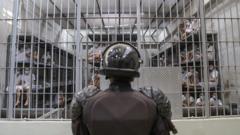The ruling temporarily pauses deportations, raising questions about immigration policies and civil liberties under the Trump administration.
**US Supreme Court Halts Deportation of Venezuelans Under Controversial Wartime Law**

**US Supreme Court Halts Deportation of Venezuelans Under Controversial Wartime Law**
Supreme Court takes action amid concerns over due process for detained Venezuelans accused of gang involvement.
The United States Supreme Court issued a pivotal order halting the deportation of a group of Venezuelans detained in north Texas under the 18th-Century wartime law known as the Alien Enemies Act. Civil liberties groups, specifically the American Civil Liberties Union (ACLU), have challenged the legality of these deportations, asserting that the detainees have not been provided a fair opportunity to contest their cases in court.
Originally invoked by former President Donald Trump, the law allows the president to detain and deport individuals from designated "enemy" nations without the typical legal processes. This controversial legal precedent has only been utilized a handful of times, most notably during wartime scenarios such as World War II when American citizens of Japanese descent faced internment without trial. The Trump administration has faced ongoing legal backlash against its stringent immigration policies, particularly as they pertain to the recent deportation of alleged members of the Venezuelan gang Tren de Aragua.
As of early April, out of 261 Venezuelans deported to El Salvador, 137 were removed under the Alien Enemies Act, raising ethical concerns regarding their treatment and the basis for their detention. Legal challenges regarding the process used to inform these detainees—many of whom are Spanish speakers—have emphasized inadequate communication about their rights to contest the deportation orders.
The ranking military and judicial branches are likely to remain at odds concerning executive authority over immigration policy, especially as dissenting voices on the Supreme Court—such as Justices Clarence Thomas and Samuel Alito—signal potential divisions within the court on this highly contentious issue. Additionally, public figures such as Maryland Senator Chris Van Hollen have become involved, spotlighting individual cases like that of Kilmar Ábrego García, who the government mistakenly deported but is claiming ties to the notorious MS-13 gang, which García and his family contest due to his lack of prior convictions.
As these legal challenges unfold, the Supreme Court’s decision to pause deportations under the Alien Enemies Act highlights critical tensions surrounding immigration, civil rights, and the expanding executive powers exercised under the Trump administration.
Originally invoked by former President Donald Trump, the law allows the president to detain and deport individuals from designated "enemy" nations without the typical legal processes. This controversial legal precedent has only been utilized a handful of times, most notably during wartime scenarios such as World War II when American citizens of Japanese descent faced internment without trial. The Trump administration has faced ongoing legal backlash against its stringent immigration policies, particularly as they pertain to the recent deportation of alleged members of the Venezuelan gang Tren de Aragua.
As of early April, out of 261 Venezuelans deported to El Salvador, 137 were removed under the Alien Enemies Act, raising ethical concerns regarding their treatment and the basis for their detention. Legal challenges regarding the process used to inform these detainees—many of whom are Spanish speakers—have emphasized inadequate communication about their rights to contest the deportation orders.
The ranking military and judicial branches are likely to remain at odds concerning executive authority over immigration policy, especially as dissenting voices on the Supreme Court—such as Justices Clarence Thomas and Samuel Alito—signal potential divisions within the court on this highly contentious issue. Additionally, public figures such as Maryland Senator Chris Van Hollen have become involved, spotlighting individual cases like that of Kilmar Ábrego García, who the government mistakenly deported but is claiming ties to the notorious MS-13 gang, which García and his family contest due to his lack of prior convictions.
As these legal challenges unfold, the Supreme Court’s decision to pause deportations under the Alien Enemies Act highlights critical tensions surrounding immigration, civil rights, and the expanding executive powers exercised under the Trump administration.



















